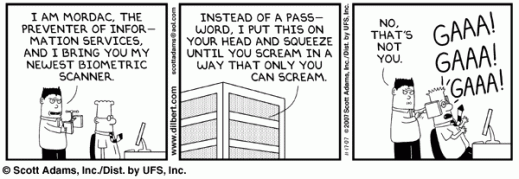Fingerprints As Credit
 Hitachi Biometric Vending Machine Requires Customers to Give It the Finger
Hitachi Biometric Vending Machine Requires Customers to Give It the Finger
Potentially coming to every corner of the globe are these Hitachi Biometric Vending Machines.
This machine requires no cash, the Hitachi Biometric Vending Machines simply use finger vein biometric authentication systems. A customer just has to give the Hitachi Biometric Vending Machine the finger.
Well, the Hitachi Biometric Vending Machine scans the customer’s finger and if the person is registered, the price of the soda or snack will be deducted from a chosen credit card.
I say to truly "Give It The Finger". Don't succumb to the Globalist Agenda!
Check out the latest Biometric Invasions of Privacy!
Biometrics in the Sky
From the outside, it seems that one of the central beliefs in the US government is that if they can collect every person’s biometrics on Earth and put that into a database, then they can substantially solve all their security problems. Federal authorities have pursued this approach almost single-mindedly over the past few years.
Sometimes these efforts have been overt. A good example is the US-VISIT Program where visitors to the US have to endure lengthy delays as everyone’s fingerprints (currently both index fingers but soon all ten) and photograph are taken.
For me personally, after a 12-13 hours flight, the thought of another two hours standing in a line to get my fingers squashed by a “friendly” official so that the fingerprint reader gets an acceptable reading within a couple of attempts means that I try to avoid travelling to or via the US altogether.
In classic government doublespeak, the benefits of US-VISIT are touted as “Protects the privacy of our visitors” and “demonstrate that we remain a welcoming nation.” Yeah, right!
Sometimes the US efforts to collect the biometrics of every single human being have been more subtle. I think the current “Server in the Sky” concept falls into this category. Police from the International Information Consortium (US, UK, Canada, Australia, and NZ) will be able to exchange biometrics and personal information about criminals and suspects. New Zealand is “considering joining the consortium.”
These five countries already share intelligence amongst themselves and co-operate in running Echelon, the global eavesdropping service that can listen into telephone, radio, and email communication.
What’s subtle about this is that anything submitted for matching also gets added to the US biometrics database. And that’s another step forward in the grand plan to collect the world’s biometrics.
What’s wrong with this? Why shouldn’t we all do our bit in the fight against global terror and criminals? If you haven’t done anything wrong, surely you have nothing to fear from having your biometrics in a US database?
You do… because the central belief that collecting the world’s biometrics will substantially solve all the US’s security problems is wrong. Because the US federal authorities have not proven themselves worthy of such trust. Because the US has a long history of subsequent misuse to achieve more pressing national security concerns. Because “acceptable collateral damage” from data inaccuracies means a lot of grief for some innocent people.
On the identity trail
Over the past two weeks, I’ve spent some time on the road as a part of the igovt public consultation. It took me to the suburbs of big cities- Porirua (Wellington) and Manukau (Auckland)- but also smaller cities like Westport.
At each place, there were discussions with both the general public as well as those from specific community segments, such as students or businesses. The meetings were in a focus group format over three hours that allowed for an in-depth look at the issues.
It was a truly fascinating, wonderful experience.
The discussions spanned a wide range of topics including peoples’ perceptions and views about government, the digital divide, online government services, identity, protecting privacy, internet security, biometrics, authentication types, charging models… and much, much more.
I spend so much of my life thinking about these topics that talking to a wide range of people makes for a great reality check. I was particularly pleased to find that the view from my ivory tower wasn’t that different than that from the paddock.
If there was one unifying view, it was the eagerness and willingness of people to participate in shaping a service that will touch them all. The classic Kiwi attitude of giving new things a go combined with earthly common sense.
Above all, there were the everyday stories; our place, our lives. And, the reminder of what it means to work for government- the opportunity to make a difference.
Everyday biometrics
Everyday biometrics is this Dilbert cartoon on “voice verification”. Now here’s an idea from Japan that can have all sorts of interesting applications.
Now here’s an idea from Japan that can have all sorts of interesting applications.
 Now here’s an idea from Japan that can have all sorts of interesting applications.
Now here’s an idea from Japan that can have all sorts of interesting applications.Fujitaka Co. has introduced a cigarette vending machine that uses facial recognition to determine if the person is older than 20 years, the legal age to buy cigarettes. It is based on evaluating the person’s bone structure, wrinkles, and the way skin sags.
Just think of the potential. Hamburger? Sorry, you’re overweight. Afternoon at the beach? Sorry, skin type prone to burning. Coffee? Sorry, you look like a tea person.
But, before you go rushing to snap up the world rights, consider this comment by CB-in-Tokyo:
“Well here is the Honne and the Tatemae (the real thing and the appearance or facade) of Japanese culture at work.”
“It is not about actually preventing minors from purchasing cigarettes, it is about making the appearance of doing so. By making the appearance of doing so, these vending machines will continue to be allowed, and it may even stop them from being “turned off” at 11:00 PM as they are now.”
In other words, pure security theater.
